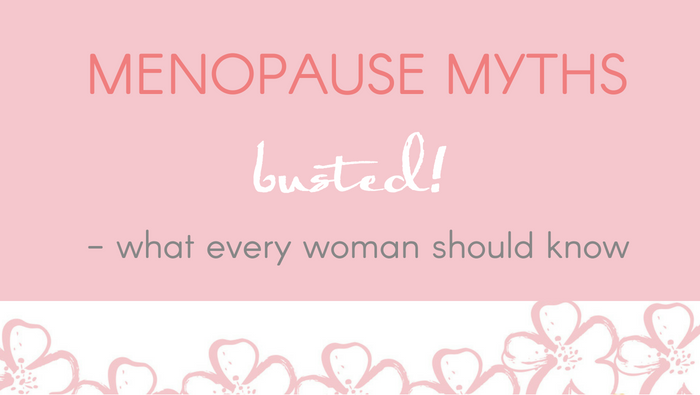What IS Menopause?
Before we get down to busting menopause myths, let’s get on the same page, ladies. Let’s be clear on what natural menopause IS. Here’s some basic definitions:-
PREMENOPAUSE is the time from your first period to your last.
PERIMENOPAUSE is the time leading up to periods stopping and being stopped for a year. It usually last 2- 6 years. This is usually when women start to notice some changes.
MENOPAUSE is the point that you had your last period, but of course you won’t know it’s the last until after a year has gone by.
POST MENOPAUSE is the rest of your life after your periods have been stopped for a year.
So you see, when people talk menopause they are often talking about the perimenopause. That’s when many women start to suffer some symptoms.
Okay, now that we are talking the same language, let’s get down to business. Let’s bust a few menopause myths!
Menopause Myths 1. Menopause is a medical condition
The fact is that it’s a life stage, a transition. No more a disease than puberty or pregnancy.
I’ve said it before. I choose to see it as a rites of passage to be the wise woman I was born to be … either that or the purple-wearing, stick-wielding, brandy-drinking woman of the Jenny Joseph poem I was born to be.
Which leads me to …
Menopause Myths 2. The only way to get through menopause is with HRT.
You know that one of my guiding principles is that we all have choices in healthcare. And that we’re all individuals.
It’s up to each woman to decide if she wants meds to relieve symptoms or – like me – manage it nature’s way.
I do urge women to do the research. Understand what’s in drugs because you might object to ingredients or be allergic to them. Find out what the risks and side effects are as well as benefits. Meds can deplete people nutritionally over time. And that leads to the health issues. You must decide what’s right for you.
You could always start with self-care first and see what symptoms are left and whether you can manage them.
Menopause Myths 3. Menopause is something you need to worry when you’re late 40s or 50s.
Sorry girls. Another of those menopause myths. Natural menopause (a year since last period) is often around aged 50 but could be much earlier or later than that. It could be from 30s to 60s.
And as I wrote earlier, the change can take several years, anyway.
Menopause Myths 4. You can’t get pregnant if you have menopause symptoms.
No. Don’t abandon all birth control with your first hot flush, if you don’t want a baby/another baby.
The fact is that you can become pregnant when you’re perimenopausal i.e. going through the transition. You might still be releasing eggs in some monthly cycles. It’s not until you are post menopause i.e. a whole year after your last natural period that you won’t get pregnant.
I suggest using methods of contraception that are less harmful to health and hormones – like barrier methods or natural fertility awareness.
Menopause Myths 5. All signs and symptoms in your 40s and 50s are down to menopause.
Midlife Misses, signs like weight gain and hair thinning can simply be a result of ageing or a mix of ageing and menopause. Double whammy. Whoopy do.
Or they could be signs of poor food and lifestyle choices. And that could be changed.
In other cases, symptoms could be down to an undiagnosed condition, If you’re concerned, see your Doctor.
I do have some top tips on middle aged spread and managing your muffin top in a fab blog, by the way.
Menopause Myths 6. Menopause saps your brain.
Memory and other mental functions change through life. There’s no firm evidence that memory declines due to menopause.
Let’s keep ourselves active – physically, mentally and socially – to keep those cogs whirring in our middle and senior years.
Some women do report fuzzy thinking and brain fog as a symptom of menopause. In my experience, these symptoms can often be helped with good diet, drinking plenty of filtered water and getting enough sleep.
Menopause Myths 7. Menopause can lead to incontinence
Nah. Another fib. Some marvellous and mature women do suffer a little urinary incontinence but it’s most likely the result of history of childbirth, less tone in pelvic floor muscles, weight gain or some medical conditions.
If you suffer with this, try toning up your pelvic floor or see your Doctor.
Menopause Myths 8. Menopause weight gain CAN’T be avoided.
Weight management can become tougher during perimenopause and later. It needn’t mean piling on tons of unwanted pounds, though.
During perimenopause and menopause, our ovaries make fewer sex hormones and we can suffer hormone imbalance.
Your body is clever and “helpful” (!) and it tries to protect itself by storing fat around the waist, hips, and thighs. Fat stored in these areas produces more oestrogen, which in turn, leads to more fat being produced.
The more oestrogen deficient you are the more it seems that fat sticks to your hips and thighs. *sighs*
BUT, you can still achieve a healthy weight. Eating for nutrition and reducing carbs can help a lot. That’s one for another day…
Menopause Myths 9. EVERYONE’S sex-drive nose dives
On my Facebook page I remember one lovely mature lady posting “Lordy, I hope not. You can shoot me now!” or something like that, anyway. And many women fear about any changes to sex-drive on their relationships.
But sex can be enjoyed with age.
Hormone imbalance CAN impact sex-drive. At any age. For example, low thyroid can lead to low sex-drive.
And other factors can influence sex-drive – stress, tiredness, depression, too much alcohol, general health …
During perimenopause and menopause, some women suffer vaginal dryness, itching or cystitis. So sex is painful or it leads to bladder infection. Which means they don’t want to do it. Hardly surprising. Natural lubricants, probiotics and cranberries/unsweetened and natural cranberry juice/cranberry extract supplement might help.
Some women feel less attractive and sexy when their bodies are changing. Most likely their partner still finds them really hot (and I’m not talking flushes).
Testosterone can be reduced after menopause which can lead to reduced sex-drive. It’s the hormone that affects libido. So yes, some women do notice a difference in their desire.
For other women sex-drive increases after the “change” – possibly as a result of not worrying about unwanted pregnancy or because reduced oestrogen makes testosterone more dominant.
Menopause Myths 10. It’s all about the hot flushes
Every women gets them right? WRONG. The most common of the menopause myths.
While they are a common symptom, not everyone gets them.
Did you know they are whole bunch of symptoms linked to menopause – some women have them and don’t even make the connection.
Here’s some other potential signs of perimenopause and menopause:-
- Tiredness
- Irregular periods or heavy periods
- Mood swings
- Depression
- Anxiety
- Irritability
- Weight gain
- Hair loss
- Cravings
- Fuzzy thinking
- Lower libido
Some symptoms might be more common that others, but every woman experiences the change of life differently.
So what does all this mean, huh?
It means that menopause is a life stage and every women experiences it differently.
It means that super self-care goes a long way to help relieve symptoms, not just of menopause but of getting older generally.
It means that if you’re worried you should speak with your doctor for tests, diagnosis and to discuss options.
Hopefully, it means I busted a few menopause myths and you ladies are better prepared and better informed. I aim to serve.
Love,



Recent Comments